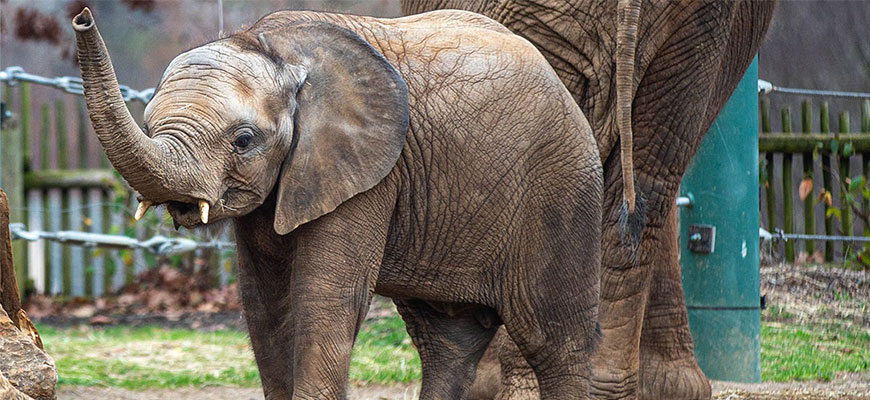Contact: Robert Kemnitz
robert.kemnitz@louisvilleky.gov
(C) 502-744-5639
(updated 6-30-23)
The Louisville Zoo’s beloved 3-year-old elephant, Fitz, has been diagnosed with elephant endotheliotropic herpesvirus, more widely known as the EEHV virus – a potentially devastating viral infection for elephants worldwide, particularly young elephants. The viral infection has caused hemorrhagic disease (EEHV-HD). The disease strikes elephants in the wild as well as in zoos and sanctuaries.
The elephant care team first noticed signs of the virus on Sunday, June 25, when fellow elephant, Punch, repeatedly placed her trunk in Fitz’s mouth, with a frequency that is abnormal behavior for the animals. Upon further observation, staff members noticed Fitz acting somewhat lethargic. A blood sample was sent to the Smithsonian Zoo, which confirmed the EEHV diagnosis on June 28. While most elephants worldwide are believed to be born or exposed to the virus shortly after birth, it often remains dormant in their bodies. It is unknown what leads the virus to cause hemorrhagic disease — EEHV-HD. Many elephants can fight off the disease, but it is harder for weaned calves since they are no longer protected by their mother’s antibodies. As there is no vaccine, Fitz had been routinely monitored and tested for signs of the disease. EEHV-HD is of serious concern, with a 20-30% survival rate.
“Our highest priority is keeping Fitz as comfortable and safe as possible. As he’s receiving treatment and under medical care, he will not be viewable to the public, but we hope the community will help us rally behind Fitz,” said Louisville Zoo Director, Dan Maloney. “Our entire animal health and animal care teams are working around the clock to help Fitz, and we are thankful for the support of other zoos across the country that have already reached out to assist.”
In addition to lethargy, signs of the EEHV-HD could include unwillingness to eat, a rapid heartbeat, decreased white blood cell and platelet count, and edema. The disease one of the most serious medical issues facing elephant species today. Once a blood test confirms EEHV-HD, diagnosed elephants receive antiviral medications, blood and plasma transfusions, as well as stem cell and supportive therapies to help fight the virus.
Zoos around the country accredited by the Association of Zoos and Aquariums have been in touch with the Louisville Zoo to offer assistance and guidance regarding the virus. Some have also sent blood and plasma donations to be given to Fitz.
Our two adult females are behaving and eating normally. No other animals or the public are at risk from the virus.
The Louisville Zoo will take several steps to inform the public of Fitz’s progress. Regular updates will be shared as they become available on the Zoo’s social media and website at louisvillezoo.org/fitz. The public is encouraged to leave photos and well wishes for Fitz on the Zoo’s social media pages.
***
The Louisville Zoo, the State Zoo of Kentucky, is the top non-profit, paid attraction in the state. The Zoo is dedicated to bettering the bond between people and our planet by providing excellent care for animals, a great experience for visitors, and leadership in scientific research and conservation education. The Zoo is accredited by the Association of Zoos and Aquariums (AZA).
# # #

